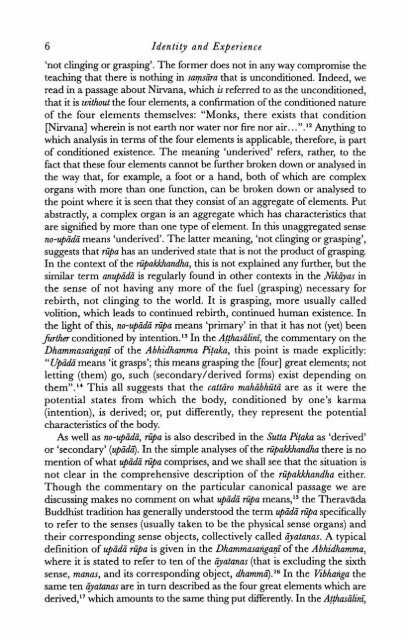Identity and Experience_Hamilton_1996
Identity and Experience_Hamilton_1996
Identity and Experience_Hamilton_1996
You also want an ePaper? Increase the reach of your titles
YUMPU automatically turns print PDFs into web optimized ePapers that Google loves.
6 <strong>Identity</strong> <strong>and</strong> <strong>Experience</strong><br />
'not clinging or grasping'. The former does not in any way compromise the<br />
teaching that there is nothing in samsiira that is unconditioned. Indeed, we<br />
read in a passage about Nirvana, which ir referred to as the unconditioned,<br />
that it is without the four elements, a confirmation of the conditioned nature<br />
of the four elements themselves: "Monks, there exists that condition<br />
[Nirvana] wherein is not earth nor water nor fire nor air.. .". l2 Anything to<br />
which analysis in terms of the four elements is applicable, therefore, is part<br />
of conditioned existence. The meaning 'underived' refers, rather, to the<br />
fact that these four elements cannot be further broken down or analysed in<br />
the way that, for example, a foot or a h<strong>and</strong>, both of which are complex<br />
organs with more than one function, can be broken down or analysed to<br />
the point where it is seen that they consist of an aggregate of elements. Put<br />
abstractly, a complex organ is an aggregate which has characteristics that<br />
are signified by more than one type of element. In this unaggregated sense<br />
no-upidi means 'underived'. The latter meaning, 'not clinging or grasping',<br />
suggests that rzipa has an underived state that is not the product of grasping.<br />
In the context of the nipakkh<strong>and</strong>ha, this is not explained any further, but the<br />
similar term anupidi is regularly found in other contexts in the JVikZyas in<br />
the sense of not having any more of the fuel (grasping) necessary for<br />
rebirth, not clinging to the world. It is grasping, more usually called<br />
volition, which leads to continued rebirth, continued human existence. In<br />
the light of this, no-upid5 nipa means 'primary' in that it has not (yet) been<br />
firthm conditioned by intention.13 In the Atthasilinc the commentary on the<br />
Dhammasanganf of the Abhidhamma Pitaka, this point is made explicitly:<br />
"Upda means 'it grasps'; this means grasping the [four] great elements; not<br />
letting (them) go, such (secondary/derived forms) exist depending on<br />
them".14 This all suggests that the cattiro rnahzbhziti are as it were the<br />
potential states from which the body, conditioned by one's karma<br />
(intention), is derived; or, put differently, they represent the potential<br />
characteristics of the body.<br />
As well as no-upidi, rzipa is also described in the Sutta Pitaka as 'derived'<br />
or 'secondary' (upczdq. In the simple analyses of the rzipakkh<strong>and</strong>hd there is no<br />
mention of what upi& nipa comprises, <strong>and</strong> we shall see that the situation is<br />
not clear in the comprehensive description of the rzipakkh<strong>and</strong>ha either.<br />
Though the commentary on the particular canonical passage we are<br />
discussing makes no comment on what ~piidi rzipa means,15 the Theravada<br />
Buddhist tradition has generally understood the term updi nipa specifically<br />
to refer to the senses (usually taken to be the physical sense organs) <strong>and</strong><br />
their corresponding sense objects, collectively called gatanas. A typical<br />
definition of upa'di rCpa is given in the Dhammasanganiof the Abhidhamma,<br />
where it is stated to refer to ten of the gatanas (that is excluding the sixth<br />
sense, manas, <strong>and</strong> its corresponding object, dhammZ).16 In the Vibhanga the<br />
same ten 6yatunas are in turn described as the four great elements which are<br />
derived," which amounts to the same thing put differently. In the At.thasa'lin


